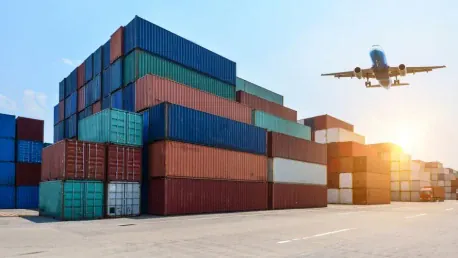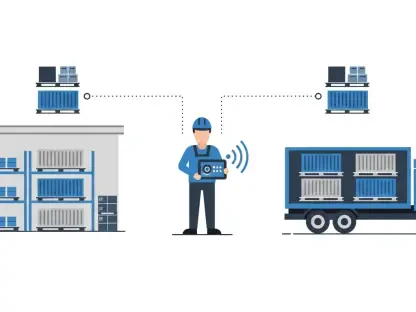The air cargo industry has experienced transformative growth, becoming a critical element in the strategies of top airport operators worldwide. This article explores how air cargo is reshaping trade dynamics globally and within Africa, driven by technological advancements, shifts in trade patterns, and strategic initiatives like the African Continental Free Trade Area (AfCFTA).
Global Market Growth and Technological Advancements
Surge in E-commerce and Consumer Expectations
Since August 2023, the global air cargo market has seen significant developments, with the International Air Transport Association (IATA) reporting consistent double-digit growth for seven consecutive months. A significant driver of this growth is the surge in e-commerce, which has dramatically increased the demand for air cargo services. Consumers now expect faster deliveries, necessitating efficient and speedy transportation solutions that air cargo uniquely provides, particularly for high-value and time-sensitive goods.
With the rise of online retail giants, next-day or even same-day delivery has become a standard expectation among consumers. This increasing preference for rapid delivery has led companies to turn to air cargo, as it is the most reliable and efficient mode of transport for such speedy shipments. The ability to transport goods quickly over long distances has transformed air cargo from a niche service to a mainstream logistics solution that multiple industries depend upon.
Technological Innovations in Logistics
Advancements in logistics and supply chain management, particularly through artificial intelligence and the Internet of Things (IoT), have revolutionized air cargo operations. These technologies enhance efficiency and reliability, streamlining processes and reducing delays, thereby reinforcing the industry’s growth. The integration of these innovations is pivotal in meeting the heightened demand for rapid and dependable delivery services.
AI-powered systems enable predictive analytics, optimizing cargo loads and routes to improve efficiency. IoT devices embedded in cargo shipments provide real-time tracking and condition monitoring, ensuring that goods remain in optimal conditions and arrive on time. These technologies transform how the air cargo industry operates, making it a robust and dependable component of global supply chains. The fusion of AI and IoT ensures that goods are transported quickly and securely, meeting the ever-evolving demands of global trade.
Emerging Markets and Trade Dynamics
Shifts in Global Trade Routes
Changes in global trade dynamics, especially the rise of emerging markets, have redirected air cargo routes and hubs. These shifts present new opportunities for airport operators, who can leverage their capabilities to capitalize on emerging trends. The evolving trade landscape necessitates strategic adaptations to accommodate new routes and hubs, ensuring sustained growth and competitiveness in the global market.
Air cargo operators must now develop infrastructure and expand services in regions previously overlooked, as emerging markets like Southeast Asia, Africa, and Latin America become pivotal to global trade. As trade routes pivot to accommodate these emerging economies, airports in developed and developing nations alike must be ready to handle increased air traffic and cargo volumes. This strategic maneuvering is key to maintaining relevance and superiority in a competitive global market.
Opportunities for Airport Operators
Airport operators are strategically positioning themselves to embrace these changes. By investing in infrastructure and technology, they aim to enhance their capabilities and capture emerging market opportunities. This proactive approach ensures that they remain competitive and can effectively manage the increased air cargo volumes driven by shifting trade dynamics.
Expanding cargo terminals, integrating advanced technology, and improving air traffic control systems are vital steps that airport operators are undertaking. These investments not only help airports handle higher volumes but also boost operational efficiency and customer satisfaction. Leveraging partnerships with global e-commerce and logistics companies, airport operators are widening their operational scope, ensuring that they stay at the forefront of the rapidly evolving air cargo industry.
Boosting African Trade Through AfCFTA
The African Continental Free Trade Area (AfCFTA)
The implementation of the African Continental Free Trade Area (AfCFTA) is a significant development for the air cargo industry in Africa. As the world’s largest free trade area, comprising 55 African Union member states and eight economic regions, AfCFTA aims to enhance intra-African trade, significantly boosting air cargo demand. The agreement simplifies and standardizes trade regulations across the continent, reducing barriers to the movement of goods and driving higher trade volumes.
AfCFTA’s focus on creating a unified market will enable smoother, faster, and more efficient trade processes across Africa. By addressing and eliminating trade barriers, AfCFTA promises to foster a conducive environment for businesses to flourish, enhancing economic integration. Simplified customs procedures, harmonized trade regulations, and reduced tariffs are expected to facilitate this ease of movement, making air cargo the preferred choice for many businesses trading within the continent.
Economic Benefits and Projections
AfCFTA aligns with the AU Agenda 2063 strategy, projecting substantial economic benefits such as an increase in income by $450 billion and lifting over 30 million Africans out of poverty. The World Bank estimates that AfCFTA can amplify Africa’s exports by 32% by 2035 and stimulate foreign direct investment significantly. These economic projections underscore the transformative potential of AfCFTA for the air cargo industry and the broader African economy.
The anticipated growth in air cargo demand, spurred by increased trade and investment, will create numerous new opportunities for African nations. Enhanced connectivity and the availability of more efficient transport options will stimulate local economies, create jobs, and encourage technological advancements. As air cargo becomes integral to processing larger trade volumes, the overall economic landscape in Africa is expected to undergo a profound transformation, benefiting various sectors, including manufacturing and agriculture.
ACSA’s Strategic Preparedness
Infrastructure and Technological Investments
Recognizing the growth vectors, Airports Company South Africa (ACSA) is strategically positioned to embrace the rising demand in air cargo. ACSA is investing in infrastructural upgrades, such as expanding cargo terminals and enhancing air traffic control systems, to accommodate anticipated increases in air cargo volumes. Incorporating advanced technologies within operations forms a core part of ACSA’s strategy to augment efficiency and dependability, ensuring superior customer satisfaction.
With a forward-thinking approach, ACSA is deploying cutting-edge technologies to streamline its operations. These investments are critical in adapting to new business models that prioritize rapid and efficient cargo handling. As ACSA enhances its infrastructure, it also aims to create an enabling environment that boosts trade and economic activity. These comprehensive plans ensure that ACSA remains a leading player capable of managing significant growth trajectories in the global air cargo industry.
Collaborations and Sustainability Initiatives
The air cargo industry has seen remarkable growth, making it a vital aspect of the strategic plans for leading airport operators worldwide. This article delves into the ways air cargo is transforming trade dynamics both globally and within Africa. Technological advancements have played a significant role in this evolution, allowing for greater efficiency and speed. Additionally, changes in trade patterns and major initiatives such as the African Continental Free Trade Area (AfCFTA) are key drivers in this transformation. The AfCFTA, in particular, aims to create a single market for goods and services across Africa, boosting intra-African trade and economic development. As more African countries adopt modern logistics and infrastructure, the role of air cargo becomes even more pivotal. The industry’s growth is not only changing how goods are transported but also impacting global supply chains, enhancing connectivity and fostering economic growth across continents.








